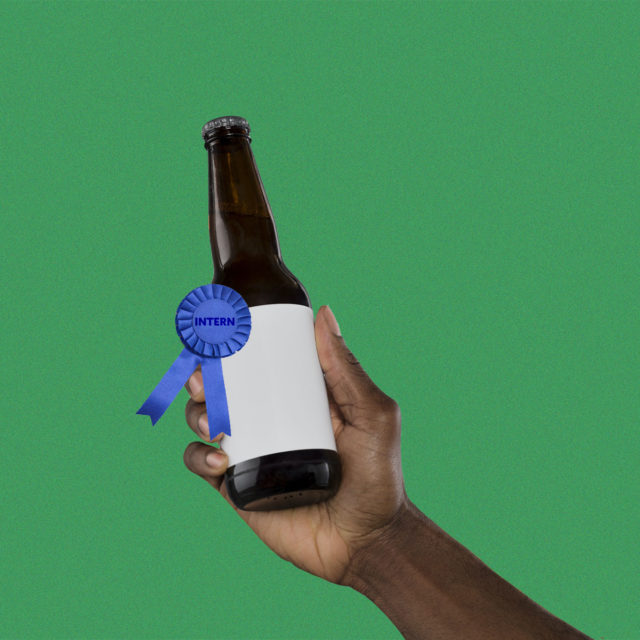Since 2017, Christopher Gandsy has been hard at work feeding Brooklynites gluten-free, Southern-style biscuits and beer. His brewery-restaurant, DaleView Biscuits & Beer, is named for the Columbia, S.C., neighborhood in which he grew up. He was influenced by his grandmother’s homemade biscuits and sells comfort food crafted from childhood memories alongside abbey ales and nitro stouts. It’s enough to keep any business owner’s plate full — but Gandsy isn’t satisfied.
In early June, the brewery owner announced on Instagram that he’ll be working with friend and fellow New York City craft beer industry member Christopher Inniss, who has worked for Rockaway Brewing Company since 2013, to establish a “farm-brewery internship program that would allow paid brewery education and experience to people of color.”
The internship is a four-week program, with each focusing on a different aspect of working in beer. Interns will learn production, front-of-house work, sales and distribution, and marketing and administration. With this program, Gandsy and Inniss are not only creating a space for Black beer drinkers in craft brewery taprooms and culture; they are creating space in the industry, too.
Creating Opportunities in Beer for People of Color
Beer’s exclusion of people of color stems back to the post-Prohibition consolidation of breweries, which eliminated opportunities for potential Black microbrewery owners, and grew into discriminatory hiring practices in Big Beer in the 1950s, effectively cutting Black people out of the beer career pool for decades. A 2019 Brewers Association study found 89 percent of U.S. brewers are white, as are 76.2 percent of non-manager production staff.
Gandsy and Inniss, who are Black, met while attending New York City Brewers Guild meetings. According to Inniss, when the two started talking, Gandsy’s commitment to his community stood out — and mirrored Inniss’s own ideas about how the industry could be more inclusive.
Both brewers have experienced firsthand the ways that craft beer can fail to welcome people of color. They recite examples such as bartenders making them feel unvalued as customers in taprooms, serving them last, or stopping to do administrative tasks before acknowledging them, along with the overarching trend of breweries opening in rapidly gentrifying neighborhoods without forging genuine connections with residents. This reinforces locals feeling alienated, rather than included, in craft beer culture.
Beyond biscuits and beer, DaleView acts as an inclusive neighborhood gathering place. “DaleView is like my dinner parties,” says Gandsy, who says he and his wife love to entertain. “[W]e’ve always had different people — investment bankers, artists, lawyers, people who worked in retail — different people with different opinions,” he says. “We’re open to everyone to come into a place where you feel comfortable to speak your mind and be heard … and you can learn something from someone else.”
The Impact of ‘Exposure, Experience, and Education’
Beer industry journalist, photographer, editor, and consultant Ale Sharpton emphasizes the lack of opportunities available to Black individuals and people of color in beer (as well as other industries): “We miss out what I call ‘The Three E’s: Exposure, Experience, and Education,’” Sharpton says. “Granted, the craft beer industry does not have ‘Whites Only’ signs, but the overall marketing, business structure, distribution, hiring practices, and [access] to craft products are definitely disproportionate.”
DaleView’s internship program, Sharpton adds, is an example of the much-needed “Three E’s” in the beer community. But to improve equity in beer on a systemic level, similar initiatives must follow — and not only from Black-owned breweries.
“Once again, it’s Black people coming up with solutions for problems we didn’t create,” says Teo Hunter, co-founder of Crowns & Hops. Hunter and co-founder Beny Ashburn are in the process of launching Inglewood, Calif.’s first Black-owned brewery, and the pair have been working to improve craft beer’s reach to Black and Brown audiences for several years.
In other words, the onus is on white-owned breweries to create opportunities for BIPOC. Some are beginning to recognize this. On July 6, Brooklyn Brewery brewmaster Garrett Oliver announced the creation of the Michael Jackson Foundation for Brewing and Distilling, which will fund scholarships for people of color. (Although Oliver is Black, Brooklyn Brewery’s owners are white.)
“[D]iversity and inclusion cannot occur unless there’s racial equity,” Hunter says. “The evolution of our brand is that we realized it’s not about getting more Black patrons, it’s first getting more Black brewery owners.”
In this way, Hunter and Ashburn feel DaleView’s program meets a core need: showing people how many possibilities there are working in beer. “Many careers live inside the business of beer that people aren’t privy to,” Ashburn says. “We have amazing people heading up digital marketing and making beer labels — there’s so much artistry in craft beer.”
What’s Next for DaleView Biscuits & Beer
Before the internship program launches this fall, DaleView Biscuits & Beer is raising money for the program with the upcoming release of “My Skin is Black,” a dark Belgian ale. The beer will be available for order on DaleView’s website beginning Aug. 1. Beer and other merchandise purchases will go directly toward the internship program, once the cost of production of the beer is covered.
Gandsy and Inniss also hope to partner with The City University of New York, and eventually expand to include vocational students as well as college students in the internship. Some details are being hammered out before launching this fall, but the message is clear.
“The biggest part of this [internship] is it says, ‘You are welcome, I want you to be part of this, I want to give you the education so you can see how amazing this is,’” says Ren Navarro, the diversity consultant behind Beer. Diversity. “That’s the piece that’s so often missing.”
This story is a part of VP Pro, our free platform and newsletter for drinks industry professionals, covering wine, beer, liquor, and beyond. Sign up for VP Pro now!
